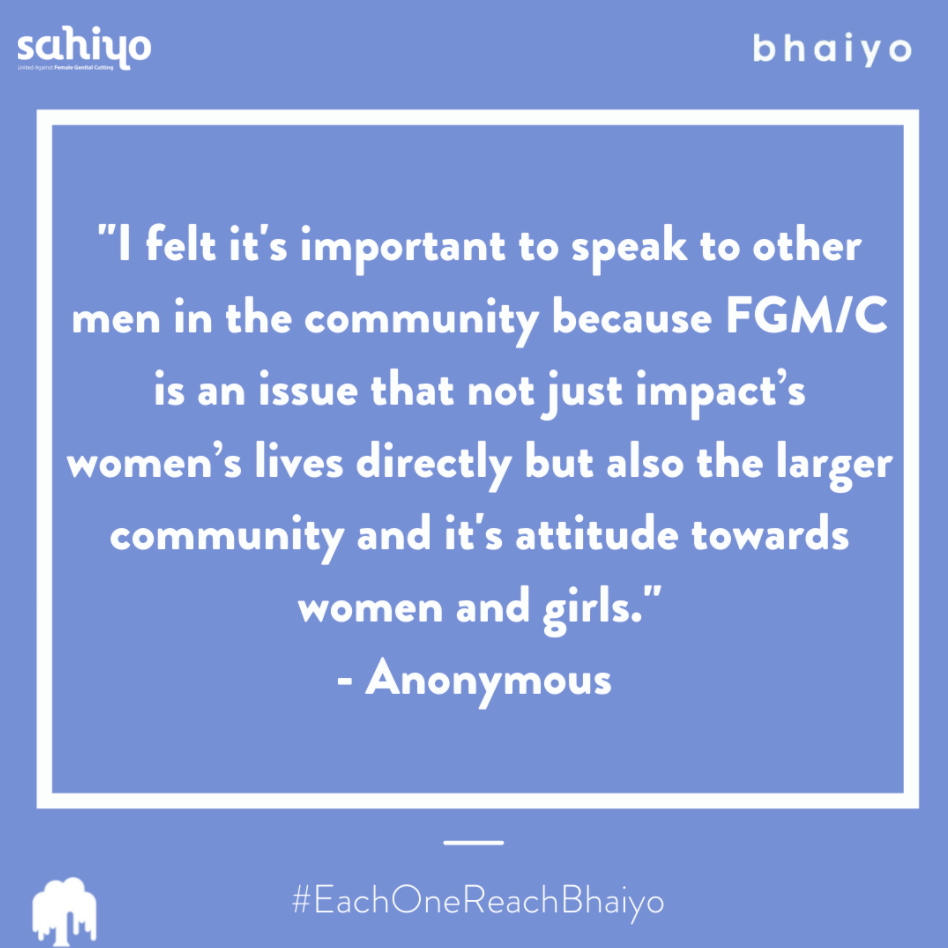By Anonymous
In honor of International Women’s Day on March 8th, Sahiyo launched our campaign “Each One, Reach Bhaiyo.” During this campaign, Sahiyo encouraged community members to reach out to and educate at least one male-identifying person in their life about female genital cutting (FGC). Through this campaign we involved men in the important work of protecting women and girls. We know that just one conversation can spark a global change towards preventing the human rights violation that is FGC amongst future generations. Learn more here.
Why did you want to reach out to another man in your life to discuss female genital mutilation/cutting (FGM/C)?
I felt it's important to speak to other men in the community because FGM/C is an issue that not only impacts women’s lives directly, but also the larger community and its attitude towards women and girls. It is necessary to engage with men to build awareness and take steps towards change. Women and also men need to participate together to speak out against FGM/C.
My usual interactions with community members are mostly with my own family, close relatives, and men who I have come across through the matchmaking process for marriage. I have a keen interest in discussing community life, rituals, beliefs, etc. with a critical lens to understand their meaning, relevance, and history. This has been part of my upbringing and an interest during my years of formal education, particularly from the perspective of gender in society. And so often my interactions with men while meeting them in arranged marriage or dating meetings are based on these topics.
What was his reaction? Was he aware of FGM/C?
I happened to meet a man called Z in his early 30s who was just finishing up his residency term in medicine and was to finally start his independent practice. We had similar observations and views about community practices and were able to have open conversations on many topics. I decided to ask him if he knew about the practice of Khatna. Z had grown up and was still living in a very orthodox community environment and that was his immediate world. However, education and studying medicine had given him an opportunity to be open minded, meet people from different backgrounds, and explore beyond community life. This was something he said he valued.
Z told me that he came to know about the practice of Khatna while he was in college through some posts on Facebook and was shocked to find that this was never spoken about in his family or community life. He studied about it in detail and came to the conclusion that Khatna has no medical benefits as is often told. He started being active about his views against FGM/C online and his family came to know about his stance. It created a lot of agitation in his family and he was told to suspend all his interest in speaking out against the issue. He felt that he has a lot to lose if he is publicly vocal against Khatna and decided to stop his involvement.
During our discussion, I told him that because of my father’s ability to question Khatna as unscientific and unnecessary, my sister and I did not go through it while we were young. My mother and grandmothers, who had all gone through Khatna themselves, were initially hesitant to not follow the tradition. I saw my father’s position as a crucial intervention. I shared with him Sahiyo’s work and approach to engage with community members. Z was not interested in being part of any group or discussions questioning FGM/C anymore. He continues to believe in private that the practice of Khatna should be stopped but cannot afford to risk his community life.
What advice would you give to others trying to reach out to the men in their lives?
In my experience with speaking to men, I came to know that a few of them are aware about FGM/C due to a lot of discussions and campaigns that are now visible on social media and easily accessible. However some are also completely unaware or don’t want to broach the subject. I have noticed that men have the ability to empathise to an extent due to their own experiences of going through male circumcision. Khatna is not about preserving a tradition but a practice of violence that has a prolonged impact on many women who go through it. This does not align with the values of modern education that the Dawoodi Bohra community strives for. I would urge others to speak with men about FGM/C, and open up conversations to share experiences, facts, and outcome of research studies to help them understand better. Even if men can’t come forward openly to their own families, I believe a conversation can certainly open up possibilities for the future.

